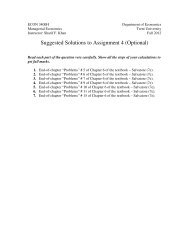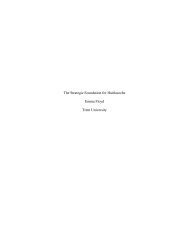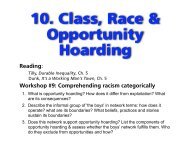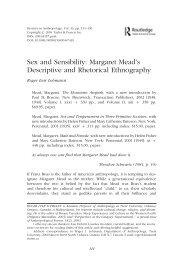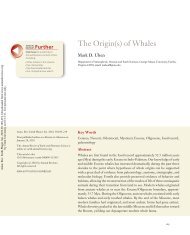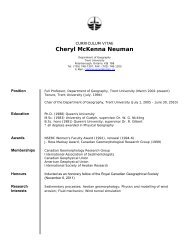REO FORTUNE'S PSYCHOLOGICAL THEORY OF CULTURAL ...
REO FORTUNE'S PSYCHOLOGICAL THEORY OF CULTURAL ...
REO FORTUNE'S PSYCHOLOGICAL THEORY OF CULTURAL ...
You also want an ePaper? Increase the reach of your titles
YUMPU automatically turns print PDFs into web optimized ePapers that Google loves.
Fortune’s Theory of Cultural Ambivalence<br />
285<br />
Fortune accepted the Freudian symbolism of the feminine, watery field<br />
and the castration anxiety of chopping branches off a phallic tree. He had<br />
heavily repressed the idea of sex with the woman who had rejected him.<br />
But the book so circuitously connected with her by its author’s name was<br />
explicitly about sex. Here, according to Fortune, was a dream about a<br />
would-be girlfriend, though she never appeared in its manifest content.<br />
From this dream we learn of an occasion when Fortune had been<br />
unlucky in love, and that he had nonsexually idealized his object. It would<br />
appear that while Fortune was exploring sexually liberal attitudes in waking<br />
life, he retained prudish feelings. There is little wonder that Mead’s introducing<br />
him to her own free-love beliefs challenged Fortune’s sensibilities,<br />
in spite of his consciously held degree of liberality (see Thomas 2009).<br />
The Dream of Irises<br />
Like the Dream of Stopes, this dream had a simple manifest content, but<br />
the context and analysis Fortune provided is complex, because he saw deep<br />
repression as retaining its true meaning beyond consciousness:<br />
I am speaking at a public gathering in favour of the Labour Party.<br />
Then I am climbing, climbing, continually climbing a long ladder.<br />
At the top I mount into a great cluster of large red roses, very<br />
fragrant and extending away a great distance on either side.<br />
I descend the ladder. Half-way down is a long bed of white lilies.<br />
I descend through them and come at the foot of the ladder to a<br />
great bed of irises, deep blue irises, extending, a solid mass of<br />
colour, as far as I can see in either direction. (Fortune 1927, 58)<br />
Fortune explained that he did, in fact, support the Labour Party, which he<br />
saw as rejecting uncritical patriotism. Some days earlier, he had engaged in<br />
a heated argument with supporters of the Conservatives, who had angrily<br />
accused him of being disloyal when he suggested that expenditures to the<br />
royal family might be regarded as “a national extravagance” (Fortune 1927,<br />
59). Immediately before the dream, he had read a piece of conservative<br />
literature that described Labour as disloyal. Fortune (1927, 61) recalled an<br />
event six months earlier when the former premier, “a strong Imperialist,”<br />
had died. The premier represented a form of patriotism that Fortune found<br />
distasteful. At the time, Fortune was teaching at a school, and was obliged<br />
to honor the deceased by setting the flag at half-mast. He had to ascend a<br />
ladder and nail the flag into correct position. Fortune used this background<br />
pacs-32-02-06.indd 285 9/7/2009 2:32:33 PM



